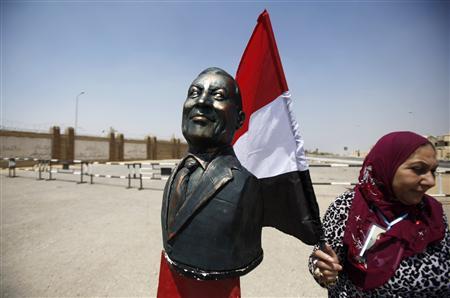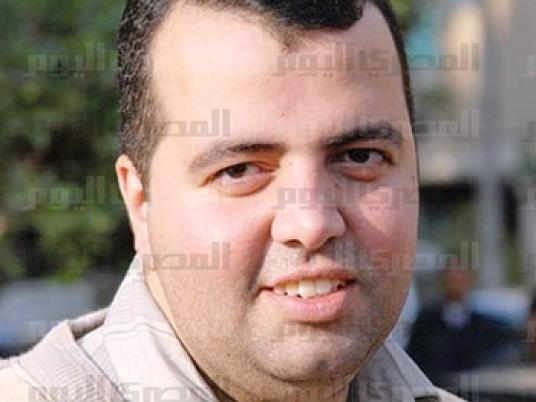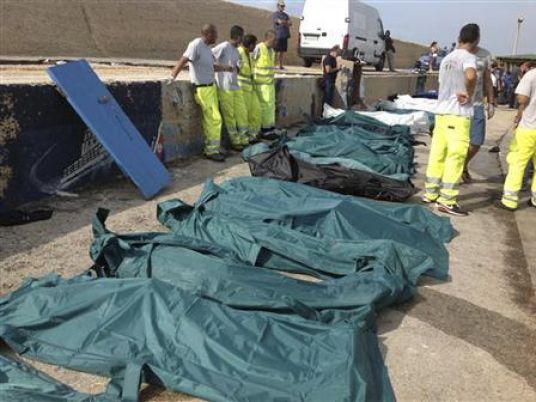Naeema Abdel Mageed Sharaf sits cross-legged on the bed cradling her seven-week-old grand-daughter.
“My son was so happy when Fatima was born,” she says, her eyes swelling up with grief. “He hoped to make everything for her.”
But tragically he never got the chance. Just 17 days after Fatima was born, Gameel Hussein was stabbed to death by pro-Mubarak thugs on his way to work last month.
Gameel and his 28-year-old wife, Walaa, had been trying for a child since they got married ten years ago. Their first, a baby girl, died just a week after Walaa gave birth two years ago.
Fatima was their dream-come-true.
“He wanted to make his family happy,” says 56-year-old Naeema, speaking in the cramped, lime-green living room of the family house in Ayrout Basous, a village in Qanatir al-Khayriyah, northern Cairo. “But his dreams weren’t achieved. He didn’t realize them.”
On the morning of 4 February at around 10AM, Gameel, 36, was confronted by a gang of tens of thugs as he made his way into work along with his cousin, Sameh.
Gameel worked as a security guard for a branch of the Commercial International Bank. Unfortunately for Gameel, the bank was located in downtown Cairo, where tens of thousands of demonstrators were at that time camped-out in Tahrir Square calling for the overthrow of former President Hosni Mubarak.
According to his family, Gameel supported the protests. “He was happy with what was happening. It was a revolution against the system and people were fed up with the oppression,” says his cousin Saeed Mohamed Abu Sabeh.
He also visited Tahrir Square during the demonstrations–but only once, according to his 28-year-old brother Amr. “I don’t remember the date,” says Amr. “Maybe it was 27 January.”
So, like millions of others, Gameel was excited about the change that was coming. Yet he was hardly one of the hardened shock-troops of the anti-Mubarak movement.
It did not matter. As he reached the main road which took him to work in downtown Cairo every day, his path was blocked by scores of knife and club-wielding Mubarak supporters standing beneath an overpass.
“They said to him and Sameh, ‘You’re not leaving this place.’ They didn’t give him a chance to think,” says Amr
After running back a few yards onto a rubbish-strewn sidetrack alongside a murky river, Gameel’s attackers set on him with knives and clubs just meters away from a neglected, shabby-looking mosque. According to his family, he was knifed five times. His cousin Sameh was lucky enough to escape with just a beating.
“He was taken to hospital by a stranger,” says Amr, who works in a coffee shop near the family home. “But they turned him back from there because they were so busy. He died here in our house.”
Gameel was the main bread-winner in the family. His elderly father, 62-year-old Mousad, is a bowab, but is sick and does not work regularly.
According to Naeema, Gameel was responsible for the whole family, including his brother and five sisters.
“He was caring for his ill father and was the only one working properly in the family. He was the one responsible for marrying his sisters and for the education of the family,” she adds.
“He was a very, very good and caring person. He was responsible for the whole family. When his father had a heart attack Gameel was the one who looked after him.”
Gameel was a keen body-builder. Amr says his favorite weight-lifting star was Ronnie Coleman, a professional body-builder from America. Before becoming a security guard he graduated from an institute for industrial workers. “He succeeded in all of the years,” says Naeema. “He didn’t drop down.”
According to Amr, Gameel used to drop in to the café near his house after work to play dominoes with his friends. Usually he would stay awake until 1AM.
“Even when he went to the coffee shop he was the one talking about the demonstrations,” says Amr.
“Everyone was working here in the village, but he was working in the place with all the protests. He was the one who was seeing it for real. We hope that God has given him mercy and that he is in heaven now. I hope the story of my brother reaches the Egyptian people just like all the other martyrs in the Egyptian revolution.”




